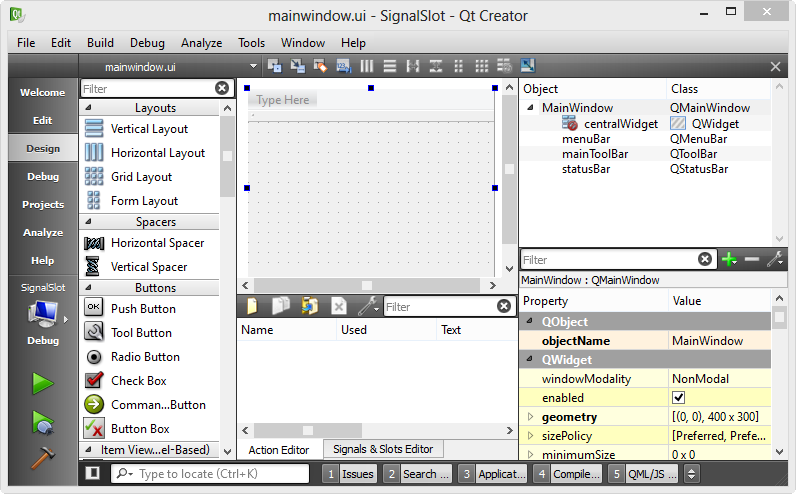Qt5 Signal Slot Arguments
This page describes the use of signals and slots in Qt for Python.The emphasis is on illustrating the use of so-called new-style signals and slots, although the traditional syntax is also given as a reference.
- Qt5 Signal Slot Arguments Examples
- Qt5 Signal Slot Arguments Bot
- Qt5 Signal Slot Arguments Download
- Qt5 Signal Slot Arguments Examples
- Qt5 Signal Slot Arguments 3
The main goal of this new-style is to provide a more Pythonic syntax to Python programmers.
- 2New syntax: Signal() and Slot()
What I need to do to make this work is call a method in the plugin that returns the widget, a list of its signals and a list of its slots. And then after matching them appropriately I need to be able to connect them. Is there a way to 'pass' signals and slots as arguments or maybe another better way to accomplish the same thing. Defining this macro will disable narrowing and floating-point-to-integral conversions between the arguments carried by a signal and the arguments accepted by a slot, when the signal and the slot are connected using the PMF-based syntax. This function was introduced in Qt 5.8. See also QObject::connect. QCLASSINFO (Name, Value). A slot may not have more arguments than the signal that is connected to it, but may have less; the additional parameters are then discarded. Corresponding signal and slot arguments must have the same types, so for example, we could not connect a QDial's valueChanged(int) signal to a QLineEdit's setText(QString) slot. Selecting Overloaded Signals and Slots. With the string-based syntax, parameter types are explicitly specified. As a result, the desired instance of an overloaded signal or slot is unambiguous. In contrast, with the functor-based syntax, an overloaded signal or slot must be casted to tell the compiler which instance to use.
Traditional syntax: SIGNAL () and SLOT()
QtCore.SIGNAL() and QtCore.SLOT() macros allow Python to interface with Qt signal and slot delivery mechanisms.This is the old way of using signals and slots.
The example below uses the well known clicked signal from a QPushButton.The connect method has a non python-friendly syntax.It is necessary to inform the object, its signal (via macro) and a slot to be connected to.
New syntax: Signal() and Slot()
The new-style uses a different syntax to create and to connect signals and slots.The previous example could be rewritten as:
Using QtCore.Signal()
Signals can be defined using the QtCore.Signal() class.Python types and C types can be passed as parameters to it.If you need to overload it just pass the types as tuples or lists.
In addition to that, it can receive also a named argument name that defines the signal name.If nothing is passed as name then the new signal will have the same name as the variable that it is being assigned to.
The Examples section below has a collection of examples on the use of QtCore.Signal().
Note: Signals should be defined only within classes inheriting from QObject.This way the signal information is added to the class QMetaObject structure.
Using QtCore.Slot()
Slots are assigned and overloaded using the decorator QtCore.Slot().Again, to define a signature just pass the types like the QtCore.Signal() class.Unlike the Signal() class, to overload a function, you don't pass every variation as tuple or list.Instead, you have to define a new decorator for every different signature.The examples section below will make it clearer.

Another difference is about its keywords.Slot() accepts a name and a result.The result keyword defines the type that will be returned and can be a C or Python type.name behaves the same way as in Signal().If nothing is passed as name then the new slot will have the same name as the function that is being decorated.
Examples
The examples below illustrate how to define and connect signals and slots in PySide2.Both basic connections and more complex examples are given.
Qt5 Signal Slot Arguments Examples
- Hello World example: the basic example, showing how to connect a signal to a slot without any parameters.
- Next, some arguments are added. This is a modified Hello World version. Some arguments are added to the slot and a new signal is created.
- Add some overloads. A small modification of the previous example, now with overloaded decorators.
- An example with slot overloads and more complicated signal connections and emissions (note that when passing arguments to a signal you use '[]'):
Qt5 Signal Slot Arguments Bot
- An example of an object method emitting a signal:
Qt5 Signal Slot Arguments Download
- An example of a signal emitted from another QThread:
Qt5 Signal Slot Arguments Examples
- Signals are runtime objects owned by instances, they are not class attributes: